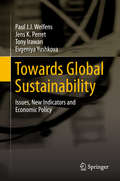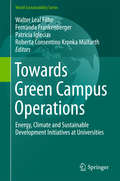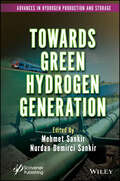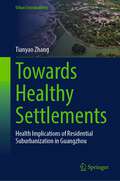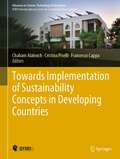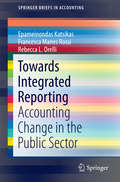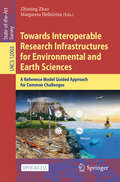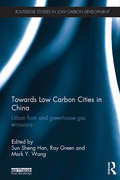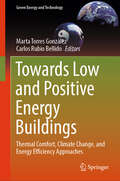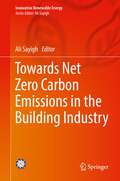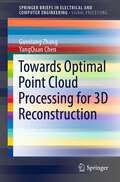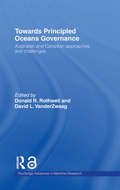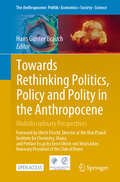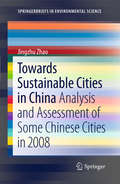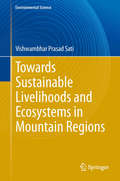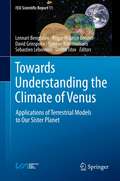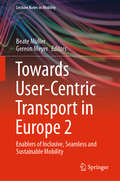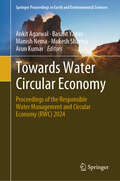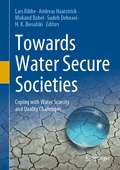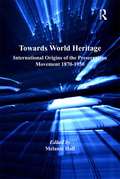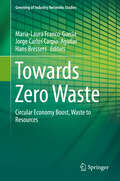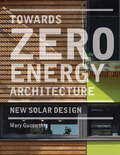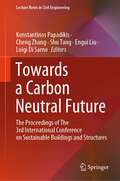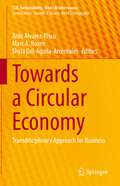- Table View
- List View
Towards Global Sustainability
by Paul J. J. Welfens Jens K. Perret Tony Irawan Evgeniya YushkovaThis study develops a new indicator for national and global sustainability. The main components of the EIIW-vita indicator are: the share of renewable energy, the genuine savings rate and the relative "green export" position of the respective countries; it is in line with OECD requirements on composite indicators. As green exports are related to technological progress and environmental-friendly products, there is also a Schumpeterian perspective of this indicator. An extended version furthermore looks at water productivity. The analysis highlights the BRIICS countries as well as the US, Germany, France, Spain, Italy, the UK and Japan. Moreover the special challenges and dynamics of ASEAN countries and Asia are discussed. The book derives key implications for economic and environmental policy and shows that the new global sustainability indicator is not only relevant for green progress, but also useful as a signal for international investors. The construction of the EIIW-vita global sustainability indicator is such that investors, citizens and governments can easily interpret the results. Correlation analysis of the new sustainability indicator with the human development index indicates complementarity, so that a new hybrid superindicator can be constructed. Sustainability rhetoric dominates environmental policy. This fresh assessment of key "pillars" of sustainable economic performance and growth is a valuable contribution to greening the economy, the leitmotiv of the latest Rio Earth Summit. The book places the discussion of sustainability on solid data. The rather surprising results of its new sustainability index should make policy makers rethink their environmental and economic strategies. Prof. Dr. Peter Bartelmus Columbia University, New York Many people put the economy first when sustainability concerns are raised, while environmental indicators are often developed without a sense of socio-economic performance. This important new book bridges the gap. It sheds light on crucial indicators such as renewable energies, exporting green goods and services, genuine savings, and water productivity. And it helps to observe the impressive changes at a global scale and in countries such as China. A must read for all experts interested in those issues. Prof. Dr. Raimund Bleischwitz University College London
Towards Green Campus Operations: Energy, Climate And Sustainable Development Initiatives At Universities (World Sustainability Series)
by Walter Leal Filho Fernanda Frankenberger Patricia Iglecias Roberta Consentino Kronka MülfarthMatters related to sustainable development, albeit global in nature, are best handled at the local level. This line of thinking is particularly true to the higher education context, where the design and implementation of sustainability initiatives on campuses can demonstrate how a given university translates the principles of sustainable development into practice, at the institutional level. Yet, there is a paucity of specific events where a dialogue among sustainability academics and practitioners concerned with a) research, projects b) teaching and c) planning and infra-structure leading to campus greening takes place, so as to allow a transdisciplinary and cross-sectoral exchange of ideas and experiences on the issues, matters and problems at hand. It is against this background that this book has been prepared. It is one of the outcomes of the “First Symposium on Sustainability in University Campuses” (SSUC-2017) organised by the University of São Paulo in Brazil, Manchester Metropolitan University (UK), the Research and Transfer Centre “Applications of Life Sciences” of the Hamburg University of Applied Sciences (Germany), and the Inter-University Sustainable Development Research Programme (IUSDRP). This book showcases examples of campus-based research and teaching projects, regenerative campus design, low-carbon and zero carbon buildings, waste prevention, and resilient transport, among others. It also demonstrates the role of campuses as platforms for transformative social learning and research, and explores the means via which university campuses can be made more sustainable. The aims of this publication are as follows: i. to provide universities with an opportunity to obtain information on campus greening and sustainable campus development initiatives from round the world; ii. to document and promote information, ideas and experiences acquired in the execution of research, teaching and projects on campus greening and design, especially successful initiatives and good practice; iii. to introduce methodological approaches and projects which aim to integrate the topic of sustainable development in campus design and operations. This book entails contributions from researchers and practitioners in the field of campus greening and sustainable development in the widest sense, from business and economics, to arts, administration and environment.
Towards Green Hydrogen Generation (Advances in Hydrogen Production and Storage (AHPS))
by Mehmet Sankir Nurdan Demirci SankirReaders will find a multidisciplinary approach elucidating all the important features of green hydrogen so that science researchers and energy engineers as well as those in economics, political science and international relations, will also find value. Energy sources and generation is the foremost concern of all governments, NGOs, and activist groups. With Green New Deals and reduced or net zero emission goals being implemented on a global scale, the quest for economic, scalable, efficient, and sustainable energy systems has reached a fever pitch. No one energy source ticks all the boxes and new energy technologies are being developed all the time as potential disruptors. Enter green hydrogen with zero emissions. Hydrogen is a rare gas in nature and is often found together with natural gas. While hydrogen is the most abundant element in the known universe, molecular hydrogen is very rare in nature and needs to be produced—and produced in large quantities, if we are serious about the Green Deal. This book has been organized into three parts to introduce and discuss these crucial topics. Part I discusses the Green Deal and the current state and challenges encountered in the industrialization of green hydrogen production, as well as related politics. Chapters in this section include how to decarbonize the energy industry with green hydrogen, and one that describes a gradual shift in the approach of hydrogen production technologies from non-renewable to renewable. Part II is devoted to carbon capturing and hydrogen. Chapters on biomass mass waste-to-hydrogen conversion and related efficient and sustainable hydrogen storage pathways, life cycle assessment for eco-design of biohydrogen factory by microalgae, and metal oxide-based carbon capture technologies are all addressed in this section. The third and final part of the book was designed to present all features of green hydrogen generation. Chapters include PEM water electrolysis and other electrolyzers, wind-driven hydrogen production, and bifunctional electrocatalysts-driven hybrid water splitting, are introduced and thoroughly discussed. Audience This book is directed to researchers and industry professionals in energy engineering, chemistry, physics, materials science, and chemical engineering, as well as energy policymakers, energy economists, and others in the social sciences.
Towards Healthy Settlements: Health Implications of Residential Suburbanization in Guangzhou (Urban Sustainability)
by Tianyao ZhangThis book aims to formulate recommendations for achieving a healthy neighborhood living environment for the middle-income people in China‘s suburbs. In China, the expeditious urbanization triggers the prosperous commodity housing development, which further grows with the spatial restructuring and socioeconomic transition. Residential suburbanization is generated, accompanied with the emergence of new-middle class and the change of lifestyle. However, the health effects of suburbanization in China are overlooked. This book investigates the health performance of suburban residents and the effects of suburban living on residents‘ health. This book also examines the resident-environment transaction modes to unfold the underlying mechanism of suburban living affecting residents’ health. Suburban residents had to passively adapt to their residential environment, which is the obstacle for achieving a health-promoting environment. The institutional dynamics determining the health performance of suburban living environment were addressed with the roles of governments, developers, planners, housing managers, residents‘ committee, and ordinary residents in commodity housing development. The book found no institutional support for the creation of health-promoting environments, especially with default of governments and excessive dependence on developers for public service facilities and the absence of civil society. Thus, the book proposes that institutional innovations are necessary in term of embedding the health dimension in all sectors of the society, enlisting collaboration between public and private sectors, and between health and non-health sectors, and thus cultivating the optimization of residents-environment transactions to create health-promoting environments.
Towards Implementation of Sustainability Concepts in Developing Countries (Advances in Science, Technology & Innovation)
by Chaham Alalouch Cristina Piselli Francesco CappaThis book focuses on sustainability concepts in architecture and urban design, environmental issues, and natural resources. Today it has become essential to reduce carbon emissions, protect habitats, and preserve the delicate ecosystems of our planet. Accordingly, sustainable development has to be improved by decreasing the consumption of non-renewable resources, in order to help nature replenish itself.Further, it highlights the efforts that have been made by architects, environmentalists, engineers, students, planners and everyone in between in order to improve sustainability in various developing communities and countries.
Towards Infrared Finite S-matrix in Quantum Field Theory (Springer Theses)
by Hayato HiraiThis book presents the better understanding of infrared structures of particle scattering processes in quantum electrodynamics (QED) in four-dimensional spacetime. An S-matrix is the fundamental quantity in scattering theory. However, if a theory involves massless particles, such as QED and gravity, the conventional S-matrix has not been well defined due to the infrared divergence, and infrared dynamics thus needs to be understood in-depth to figure out the S-matrix. The book begins with introducing fundamental nature of the charge conservation law associated with asymptotic symmetry, and explaining its relations to soft theorems and memory effect. Subsequently it looks into an appropriate asymptotic state of the S-matrix without infrared divergences. The Faddeev-Kulish dressed state is known as a candidate of such a state, and its gauge invariant condition and its relation to the asymptotic symmetry are discussed. It offers an important building blocks for constructing the S-matrix without infrared divergences.
Towards Integrated Reporting: Accounting Change in the Public Sector (SpringerBriefs in Accounting)
by Epameinondas Katsikas Rebecca L. Orelli Francesca Manes RossiThis book focuses on the accounting change processes that drive integrated reporting in the public sector. The Integrated Report is a tool that allows public sector entities to quantify and convey those aspects of their organization, strategy, governance and performance that lead to the creation of public value over time. To be successfully introduced, integrated reporting must follow a specific path of accounting change. The context in which public sector entities operate, and the unique relationship between the public sector and the environment, redefine the accounting process of change to deliver an integrated report. The authors provide a fresh look at integrated reporting on the basis of the accounting change processes that drive it, helping academics and practitioners to gain a deeper understanding of the challenges and benefits in terms of public value creation.
Towards Interoperable Research Infrastructures for Environmental and Earth Sciences: A Reference Model Guided Approach for Common Challenges (Lecture Notes in Computer Science #12003)
by Zhiming Zhao Margareta HellströmThis open access book summarises the latest developments on data management in the EU H2020 ENVRIplus project, which brought together more than 20 environmental and Earth science research infrastructures into a single community. It provides readers with a systematic overview of the common challenges faced by research infrastructures and how a ‘reference model guided’ engineering approach can be used to achieve greater interoperability among such infrastructures in the environmental and earth sciences. The 20 contributions in this book are structured in 5 parts on the design, development, deployment, operation and use of research infrastructures. Part one provides an overview of the state of the art of research infrastructure and relevant e-Infrastructure technologies, part two discusses the reference model guided engineering approach, the third part presents the software and tools developed for common data management challenges, the fourth part demonstrates the software via several use cases, and the last part discusses the sustainability and future directions.
Towards Low Carbon Cities in China: Urban Form and Greenhouse Gas Emissions (Routledge Studies in Low Carbon Development)
by Sun Sheng Han Ray Green Mark Y. WangThis book explores the relationship between urban form and greenhouse gas emissions in China, providing new insights for policy, urban planning and management. Drawing on the results of a four-year multidisciplinary research project, the book examines how factors such as urban households’ access to services and jobs, land use mixes and provision of public transport impact on greenhouse gas emissions. The authors analyse data from a wide range of sources including 4677 sample households from four major Chinese cities – Beijing, Shanghai, Wuhan and Xi’an – with diverse locations, urban spatial structures and population sizes. The book explores residents’ attitudes to reducing GHG emissions and advances knowledge relating to three environmental scales – cross-metropolitan, intra-city and neighbourhood level. It also contributes to debates on low carbon policy by revealing the relevance of urban planning parameters at both the macro and micro levels. The book will be of interest to scholars in the areas of urban planning, urban management, environmental sustainability and resource utilisation, as well as urban policy makers and planners who are working toward developing low carbon, sustainable cities of the future.
Towards Low and Positive Energy Buildings: Thermal Comfort, Climate Change, and Energy Efficiency Approaches (Green Energy and Technology)
by Marta Torres González Carlos Rubio BellidoThis book evaluates the impact of climate conditions on adaptive strategies, diagnoses prosumers' energy patterns in Positive Energy Buildings, and assesses the social and global dimensions of energy poverty. Addressing the pressing challenges of energy efficiency and climate change adaptation, the book investigates the intricate realm of low and positive energy buildings, demonstrating innovative approaches essential for an environmentally inclusive society. With a focus on thermal comfort, climate change effects, and energy efficiency, the chapters present a diverse array of studies from tropical and Mediterranean climates to worldwide practical cases. By merging dynamic and adaptive energy measures, this book pioneers an holistic approach, crucial for policymakers, stakeholders, academics, and researchers in propelling the transition toward sustainable energy solutions.
Towards Net Zero Carbon Emissions in the Building Industry (Innovative Renewable Energy)
by Ali SayighTowards Net Zero in the Building Industry looks at the contributions that the building and construction industry can (and must) make to help achieve net zero carbon emissions. The building industry accounts for close to 40% of global emissions and this book brings together a global group of contributors from 15 countries to examine ways in which the industry can help with overall CO2 reduction. Coverage includes factors such as building design strategy, materials selection, use of local materials with a low carbon imprint, renewable energy use, energy conservation, greenery and appropriate aesthetics, building size and scale, climate suitability, building functionality and comfort, material recycling, and adoption of green policies. Chapter 6 is available open access under a Creative Commons Attribution 4.0 International License via link.springer.com.
Towards Optimal Point Cloud Processing for 3D Reconstruction (SpringerBriefs in Electrical and Computer Engineering)
by YangQuan Chen Guoxiang ZhangThis SpringerBrief presents novel methods of approaching challenging problems in the reconstruction of accurate 3D models and serves as an introduction for further 3D reconstruction methods. It develops a 3D reconstruction system that produces accurate results by cascading multiple novel loop detection, sifting, and optimization methods.The authors offer a fast point cloud registration method that utilizes optimized randomness in random sample consensus for surface loop detection. The text also proposes two methods for surface-loop sifting. One is supported by a sparse-feature-based optimization graph. This graph is more robust to different scan patterns than earlier methods and can cope with tracking failure and recovery. The other is an offline algorithm that can sift loop detections based on their impact on loop optimization results and which is enabled by a dense map posterior metric for 3D reconstruction and mapping performance evaluation works without any costly ground-truth data. The methods presented in Towards Optimal Point Cloud Processing for 3D Reconstruction will be of assistance to researchers developing 3D modelling methods and to workers in the wide variety of fields that exploit such technology including metrology, geological animation and mass customization in smart manufacturing.
Towards Principled Oceans Governance: Australian and Canadian Approaches and Challenges (Routledge Advances in Maritime Research)
by Donald R. Rothwell David L. VanderZwaagAustralia and Canada have been at the forefront of efforts to operationalize integrated oceans and coastal management. Throughout the 1990s both countries devoted considerable effort to developing strategies to give effect to international ocean management obligations. This key book focuses on principles of marine environmental conservation and management, maritime regulation and enforcement, and regional maritime planning and implementation. With contributions from respected scholars, this informative book collectively assesses the obligations, compliance, implementation and trends in international ocean law, particularly in giving effect to an Oceans Policy, regional maritime planning, international oceans governance, and maritime security. This book will be of interest to all academics involved with maritime studies and international law.
Towards Rethinking Politics, Policy and Polity in the Anthropocene: Multidisciplinary Perspectives (The Anthropocene: Politik—Economics—Society—Science #35)
by Hans Günter BrauchHumankind faces two anthropogenic threats to its survival that are closely linked. The first is the end of the Holocene and the start of the Anthropocene, which was marked by the test of a nuclear bomb on 16 July 1945. In the prevailing peace and security narrative, nuclear weapons and the ‘other’ (country, bloc or alliance) pose a perceived threat to humankind’s survival. In the Anthropocene narrative, ‘we are the threat’ through our way of life and the burning of fossil fuels. The start of the Anthropocene coincides with a change in the international order with the setting up of the UN and the Bretton Woods Institutions. Three stages of this order are distinguished: the Cold War (bipolarity), the post-Cold War era (unipolarity), and the end of the rule-based global liberal order (multipolarity) on 24 February 2022. In this book ten multidisciplinary perspectives discuss complexity, Anthropocene geopolitics, peace and security discourses and the debate on the Anthropocene, planetary boundaries, complex crises and integrative geography in the Anthropocene, governance and politics, and the Patriacene and gender. Both existential threats for humankind are illustrated by cover photos of the first nuclear weapons test on 16 July 1945 and by Category 5 Hurricane Otis, an extreme weather event impacting on Acapulco in Mexico on 25 October 2023. The Anthropocene as a new epoch of Earth history coincides in 1945 with a change in the international order. In the security and peace narrative, the ‘other’ and nuclear weapons pose an existential threat; in the Anthropocene narrative. This dual existential change requires a rethinking of politics, policy and polity. In the social sciences, the Anthropocene is being discussed from multidisciplinary perspectives (geography, political science, and peace, security, and gender studies). This is an open access publication.
Towards Sustainable Cities in China
by Jingzhu ZhaoTo promote China's sustainable city construction and development, this Brief has preliminarily used an assessment indicator system and development index of a sustainable city, based on a summary and analysis of the existing Sustainable City theories and practices both at home and aboard. Meanwhile, mainly based on the data from 2008, this Brief has made a tentative assessment of the development level of Sustainable City in some major Chinese cities.
Towards Sustainable Livelihoods and Ecosystems in Mountain Regions
by Vishwambhar Prasad SatiSustainable livelihoods and ecosystems are far-reaching and burning issues in the wake of high growth of population, low production and per ha yield of crops and depletion of biodiversity resources. Mountainous regions of the world are facing the menace of poverty, food insecurity and malnutrition. Further, tremendous growth in population and slow pace of development have together forced most of the population to live below poverty line. Traditionally depending upon cultivating subsistence crops for food requirement, the people living in mountainous region are unable to produce sufficient food grains to run their livelihood smoothly. The Himalayas is one of the world's biodiversity hotspots and has an abundance of natural resources: land, water and forest - life sustaining factors. The geo-environmental conditions - climate and landscape further enhance the possibility of sustainable livelihoods through eco-tourism, harnessing water resources and utilizing forests and their products sustainably. Diversifying agricultural practices through cultivating cash and cereal crops and enhancing livelihood options through extensive use of timber and non-timber based forestry products can help to eradicate poverty and provide food security. This book consists of an introduction and nine chapters, covering geo-environmental setting, socio-economy and population profile, sustainable livelihoods: diversification and enhancement, livelihood analysis, development of tourism and hydroelectricity, case studies, mountain ecosystems, sustainable mountain development and also presents a conclusion.
Towards Understanding the Climate of Venus
by David Grinspoon Sebastien Lebonnois Lennart Bengtsson Symeon Koumoutsaris Roger-Maurice Bonnet Dmitri TitovESA's Venus Express Mission has monitored Venus since April 2006, and scientists worldwide have used mathematical models to investigate its atmosphere and model its circulation. This book summarizes recent work to explore and understand the climate of the planet through a research program under the auspices of the International Space Science Institute (ISSI) in Bern, Switzerland. Some of the unique elements that are discussed are the anomalies with Venus' surface temperature (the huge greenhouse effect causes the surface to rise to 460°C, without which would plummet as low as -40°C), its unusual lack of solar radiation (despite being closer to the Sun, Venus receives less solar radiation than Earth due to its dense cloud cover reflecting 76% back) and the juxtaposition of its atmosphere and planetary rotation (wind speeds can climb up to 200 m/s, much faster than Venus' sidereal day of 243 Earth-days).
Towards User-Centric Transport in Europe 2: Enablers of Inclusive, Seamless and Sustainable Mobility (Lecture Notes in Mobility)
by Gereon Meyer Beate MüllerThis book gathers contributions from researchers and practitioners that foster user-centric, cross-modal and sustainable transport systems in Europe. It reports on cutting-edge approaches discussed within the project MOBILITY4EU, a Coordination and Support Action funded by the European Commission, and presented at the second conference “Towards User Centric Transport in Europe” that took place in Brussels in Fall 2018. The respective papers describe innovative approaches to improving urban mobility and accessibility, achieving zero-emission mobility, and guaranteeing, seamless operations. Co-creation approaches are also discussed. Highlighting technological, socio-economic and political strategies alike, the book provides researches and stakeholders with a comprehensive, timely snapshot of current measures and challenges for the mobility of tomorrow.
Towards Water Circular Economy: Proceedings of the Responsible Water Management and Circular Economy (RWC) 2024 (Springer Proceedings in Earth and Environmental Sciences)
by Mukesh Sharma Arun Kumar Basant Yadav Ankit Agarwal Manish NemaResponsible water management and circular economy aims to establish a common understanding of circular economy principles and resilience in the water sector and to support countries in the implementing those principles. It is essential for water security to deal with the effect of climate change. It can be achieved through smart water management, use of non-conventional water resources, rejuvenation of natural water systems, using advance tools and techniques and adaptation strategies. It will help in improving the water availability in terms of quantity as well as quality and human health. Smart water governance and educating society can also play an important role in achieveing the Sustainable Development Goal (SDG 6) “Water for all“. The book aims to accelerate interaction among various stakeholders.
Towards Water Secure Societies: Coping with Water Scarcity and Quality Challenges
by Lars Ribbe Mukand Babel Andreas Haarstrick Sudeh Dehnavi H. K. BiesalskiThis book describes the water security challenges with focus on water scarcity and quality in our rapidly changing world. Achieving water security is essential to promoting economic and social development, as well as resource sustainability and ecosystem integrity. Questions of water security are central to recent global agreements such as the Sustainable Development Goals (SDGs), the Paris Agreement on Climate Change, and the Sendai Framework for Disaster Risk Reduction. The thematic areas discussed here support the SDGs, with special attention to Goal 6 (“Ensure availability and sustainable management of water and sanitation”). The book is a collection of studies from engineering, social and environmental disciplines and aims at giving a balanced overview of the current , complex discourse on water scarcity and quality. It offers a source of inspiration and information for researchers, policymakers, planners, and practitioners concerning the further development of concepts, approaches, and methodologies for promoting water secure societies.
Towards World Heritage: International Origins of the Preservation Movement 1870-1930 (Heritage, Culture and Identity)
by Melanie HallHistoric preservation, whether of landscapes or buildings, was an important development of the nineteenth century in many countries. There is however surprisingly little understanding about how it took place, and research into it is narrowly focused. For example, generally landscape preservation from this time is examined separately from buildings; preservation is seen in terms of national narratives, or considered within the contexts of area studies, and it is usually seen from a specific disciplinary perspective. All of these later categorizations did not apply at the time and consequently, a very partial view is achieved. In order to begin unlocking a very complex phenomenon that has helped to define our own age, this dynamic collection of essays brings together an international and transdisciplinary line-up of academics and practitioners to reconsider preservation's origins in the second half of the nineteenth and early part of the twentieth century. With a focus on Britain and the British Empire, and including case studies from the United States, Canada, Sweden, France, Germany, Sri Lanka, 'The Holy Land', and Turkey, this book places preservation in imperial, international, and national contexts, demonstrating that there was far more interaction between different countries in this arena than may be supposed and revealing remarkable but hitherto hidden overlaps and intersections. It examines three main themes: the influence of religion; the political and sub-diplomatic aspects of preservation; and the professionalization of preservation practice. Internationalizing trends already existed through the churches, the universities, and the diplomatic services, as well as familial ties that had an important impact on preservation's epistemic communities and its targets. Other internationalizing factors include an interest in national histories and the histories of architecture and art, particularly when known through illustration; a growing interest in biography especially of 'founding fathers' or famous literary figures; and tourism. Although the focus is on architectural preservation, this book demonstrates that, in this formative period, the preservation of buildings and landscapes needs to be considered together - as it often was at the time - and in context. The conclusion reached is that the preservation movement has to be understood in imperial and international contexts, rather than in simply national or regional ones.
Towards Zero Waste: Circular Economy Boost, Waste To Resources (Greening of Industry Networks Studies #6)
by Hans Bressers María-Laura Franco-García Jorge Carlos Carpio-AguilarThis book draws on insights that originated from the Circular Economy and Zero Waste initiatives. Together these approaches try to boost the shift from “waste” to “resources” management. The content of this book is partially organized from a stakeholder perspective, revealing the managerial implications for public and private actors. Next to public policies, also illustrations come from the private sector. Petstar, Texperium and Walmart generously shared some of their best practices at in this regard. Cases from China, Indonesia, Mexico, the Netherlands and Romania are discussed in this book. In all of these different contexts they show ways to create collaborative schemes in order to “retain” the resources’ values as much as product quality and financial circumstances permit. The reader can thus take advantage of the pragmatic viewpoints that aim to inspire policy makers, researchers, students, organisations and communities to boost the needed changes towards a Zero Waste Economy.
Towards Zero-energy Architecture: New Solar Design
by Mary GuzowskiThis book explores the theories, practices and principles of new approaches to solar architecture that foster both design excellence and low-energy use. In response to the challenges of global warming and climate change, design and technology enable architects to achieve greater performance standards while at the same time developing an environmental aesthetic. The book showcases ten award-winning buildings to illustrate the aesthetic and technological design integration of solar response in contemporary zero-energy and low-energy architecture. For each project there is a detailed examination of the local climate, the design and construction, and the technology used to reduce energy use. Towards Zero-energy Architecture is a much-needed call for the design professions to redefine architecture to help solve ecological problems.
Towards a Carbon Neutral Future: The Proceedings of The 3rd International Conference on Sustainable Buildings and Structures (Lecture Notes in Civil Engineering #393)
by Luigi Di Sarno Konstantinos Papadikis Cheng Zhang Shu Tang Engui LiuThis book collects the contributions presented at the 3rd International Conference on Sustainable Buildings and Structures ICSBS2023 (Suzhou, China, 17-20 Aug 2023). This conference represents a effort of Design School of Xi'an Jiaotong-Liverpool University, together with international and local co-organizing partners from academia, industry, and professional societies. The collection aims at sharing the state-of-the-art sustainable approaches for future carbon neutrality in the built environment. This work covers a wide range of topics, including sustainable materials and infrastructures, green building design and engineering, smart construction engineering and management, sustainable urbanism and architecture, circular economy, and innovation in education for sustainable development. The contributions were selected through a rigorous peer-review process internationally. They presented the state-of-the-art ideas and approaches in engineering practices and education towards achieving acarbon-neutral tomorrow in the built environment. The collection will be of interest to academics, professionals, industry representatives, and local government officials involved in civil engineering, architecture, urban planning, structural engineering, construction management, and other related fields. The readers will be inspired by novel techniques and ideas of carbon-neutral sustainable development for the built environment.
Towards a Circular Economy: Transdisciplinary Approach for Business (CSR, Sustainability, Ethics & Governance)
by Marc A. Rosen Aldo Alvarez-Risco Shyla Del-Aguila-ArcentalesThis volume presents a transdisciplinary approach to implementing a circular economy in international business. Written by global experts, this book provides a detailed and professional focus on issues that must be improved in order to successfully implement a circular economy in a variety of industries. The book begins with a discussion of the theoretical aspects of circular economy and the challenges of going from theory to practice. The following chapters present case studies on the circular economy in different sectors of international business such as food systems, mineral processing, water management, energy process, waste management, the cement industry, and 3D printing. Issues such as the role of SMEs in the circular economy, and the progress towards circular economy 3.0, and strategies for teaching the circular economy are also discussed. The volume ends with a critique of the concept of circular economy and suggestions for future research avenues. Written with multiple stakeholders in mind, this volume will be of interest to researchers and students of economics, sustainability, international business, and management as well as industry professionals and governments working towards establishing a circular economy in their fields and jurisdictions.
